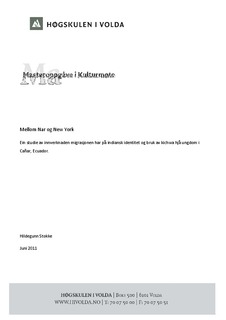| dc.description.abstract | Summary
This work explores the effects of out-migration on ethnic identity in general, and more specifically on the minority language Kichwa amongst indigenous youth in the Cañar province of the Ecuadorian Andes. Cañar, as many other places in Latin America, has over the last few decades experienced a massive labor out-migration, principally towards the United States. A big change for the people directly involved in the migration, it also affects the ones who remain in Cañar. The point of departure for the thesis is a field study in the province, carried out in late October and early November 2010. During this period over 200 young people answered a questionnaire on language, migration and ethnicity, and another 15 people participated in qualitative interviews. Additional data were gathered from observation in classrooms, fiestas, schoolyards and churches, and from a number of informal talks. The purpose of the study is threefold. Firstly, I examine which markers of ethnic identity are central to defining an indigenous person in this area. Thereafter I focus more specifically on Kichwa as one such marker, describing the use of, skills in and attitudes towards the language among my informants. The centrality of this aspect as a marker of ethnicity will then be discussed. In the last section I turn to the participants experiences with migration, and examine how these experiences may influence ethnic identity as a whole and the use of Kichwa in particular. Special attention is paid to the children of migrants, who, during their parents stay abroad, live under the care of their grandparents. Will these children, living with a generation generally more skilled in Kichwa than in Spanish, be more skilled in Kichwa compared to other children? My findings suggest that the opposite may just as well be the case; children living with grandparents seem to speak less Kichwa than others in the same situation. This may be rooted in at least two causes. For one, the discrimination the grandparents’ generation has suffered, seem to have led to an attitude towards Kichwa as a language of less value than Spanish. Another reason frequently mentioned by my informants, is the lack of respect these elders receive from their grandchildren, diminishing the influence they may have on the children’s use of Kichwa. | en_US |
